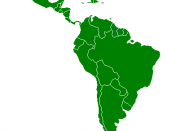Development is an abstract concept differing in opinion dependent on your personal, or cultural, set of values. In fact, the very categorization of counties into developed and underdeveloped is based on the western view that technological advancement together with capitalist system denotes a higher societal state. Europe?s constant expansion over the past several centuries has spread the latter view on development worldwide. Modernization theorists during the 1950?s expressed this Euro-centric view by claiming much of Europe, and it?s more technologically advanced colonies, to be the most ?developed? nations in the world. It was automatically presumed all nations should achieve this state, thus underdeveloped countries simply needed to follow the same route to take off into Modernity.
Cuba and Argentina were both directed on this road in the post World War two era. The results differed almost immediately. Although each successfully resisted, it was for entirely different reasons. Argentina, being one of the top developed counties in the western view, chose to pursue a more socialist route.
In contradiction, Cuba was under outside control and successfully revolted against the system pursuing a communist path and have thus been viewed as nemesis to the neo-liberal pursuit of globalization ever since. Fifty years latter, an assessment of the two Latin American countries current situations allows for a comparison of the different approach?s success in ?development?.
Cuba During the 1950?s Cuba was perceived to be developed by western standards. The per capita income of around 500$ per person was behind only Argentina and Venezuela in all of Latin America while food availability was beyond most southern nations worldwide. However these figures suggesting the Island?s advancement, only hid the huge inequality that was more evident in other southern nations. The secret cloaking device swaying Cuba?s numbers came from a larger than usual American economic interest...


